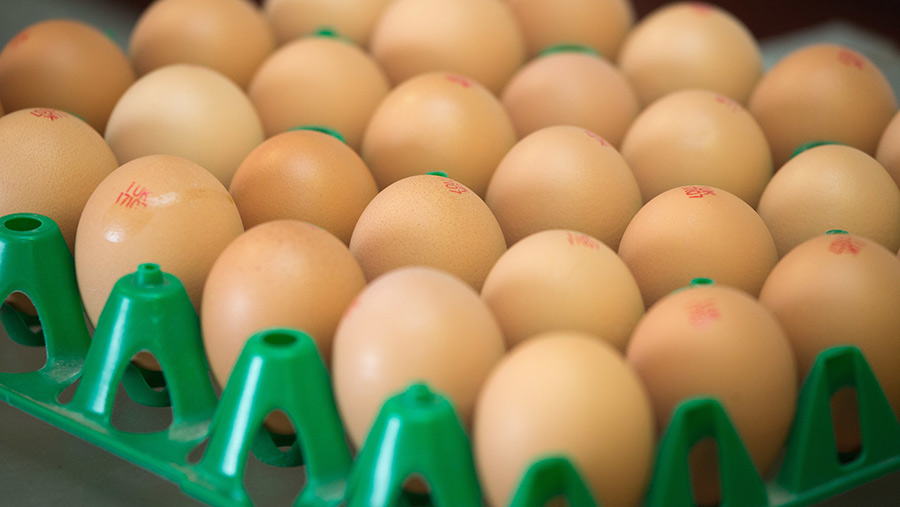Egg shortages highlight need for fairer prices, say farmers
 © Tim Scrivener
© Tim Scrivener Egg shortages in supermarkets have highlighted the need for retailers to introduce fairing pricing policies, say farmers.
Retailers have partly blamed the biggest ever avian influenza outbreak in the UK for the shortages of eggs on supermarket shelves, but NFU Scotland has described this explanation “disingenuous”.
Instead, farming unions say most retailers have not increased their prices paid to poultry farmers for their eggs in line with their increasing costs.
As a result, many have chosen to reduce their bird numbers and egg production to manage their costs.
See also: Retailers accused of failing UK farmers with imported eggs
Ioan Humphreys is a fourth-generation free-range egg producer based in mid-Wales. He has become the face of egg producers who are seeking fairer prices from retailers.
His 32,000-bird flock produces about 220,000 eggs a week and these are sold to two major retailers in Chester and Cardiff.
“There is an egg shortage in the supermarkets, but it is not all it seems. For farmers, the egg price is a far bigger factor than bird flu,” Mr Humphreys told Farmers Weekly.
“It costs more to produce the eggs than we are getting paid. We are keeping the eggs empty because it is not a viable business.
“Ten million hens have not been ordered for next year’s flocks, which is a much bigger factor than the two million that have been culled due to bird flu.”
Rising costs
Mr Humphreys said the cost of feed, electricity and new birds has gone up considerably.
“My feed bill has increased from £250/t to £400/t. My electricity bill has more than tripled from £15,000/year to £72,000/year,” he explained.
“And the cost of new birds has gone up 70p a bird. I’m a 32,000-bird unit.”
Mr Humphreys said the average egg price paid to farmers is 109p/doz.
But although some supermarkets have increased their prices by 45p/doz, this increase has not filtered down to the farmers.
“All farmers want is a fair price for our products,” said Mr Humphreys.
“We want to cover our costs and maybe make a little bit of profit if we can.”
Mr Humphreys said supermarkets display signs in their aisles showing their support for British farmers, but importing more eggs did not demonstrate this.
“We have to pay for membership for RSPCA and Lion Eggs, but what is the point if they [retailers] are just going to import more eggs?” he asked.
‘Buy British’
Mr Humphreys has received dozens of messages of support from members of the public who say they want to buy British to help farmers run viable farming businesses. One of his videos has attracted more than 1m views.
Asked how consumers could best support UK farmers, he said: “When you go to a supermarket, please ensure you are buying British.
“If you can, go to your local farm shop or local butcher’s and buy food there. The farmers are more likely to be getting paid a fairer price.”
Merseyside arable farmer Olly Harrison has published a 2min video on his social media platforms, explaining why British egg producers deserve higher prices from retailers.
The video has gone viral on Tik Tok, receiving more than 500,000 hits in 24 hours.
I RANT about supermarkets not paying fair price for eggs @sainsburys is possibly the worst #EggShortage #eggrationing #fairtrade #fairtradeforfarmers @NFUtweets @FarmingUK @FGAbiKay @FarmersWeekly @DailyMailUK @Telegraph #ollyblogs pic.twitter.com/e9FhDVICFf
— Olly harrison 🥛🍔🌱AccidentalYoutuber (@agricontract) November 19, 2022
Mr Harrison said the cost of producing a dozen eggs has increased by 30p to 145p, but this increase had not been passed on to farmers – despite retailers raising the price of eggs on the shelves to about 330p/doz.
“Supermarkets have incurred extra transport costs, which is fair enough,” he added. “But the fact is they are importing more eggs because they don’t want to pay UK farmers more.”
Mr Harrison said fairer prices were needed across the board for farmers supplying supermarkets, most notably for the pig sector.
The British Free Range Egg Producers Association (Bfrepa) has asked Sainsbury’s for an urgent meeting after the retailer confirmed it is stocking eggs imported from Italy.
“We have been warning for months that failing to pay farmers a price that allows them to make a profit would result in mass destocking or, worse still, an exodus from the industry,” said Bfrepa chief executive Robert Gooch.
“Seeing Italian eggs on the shelves is a wake-up call to all retailers that they can’t expect farmers to work for nothing. Enough is enough.”
